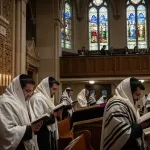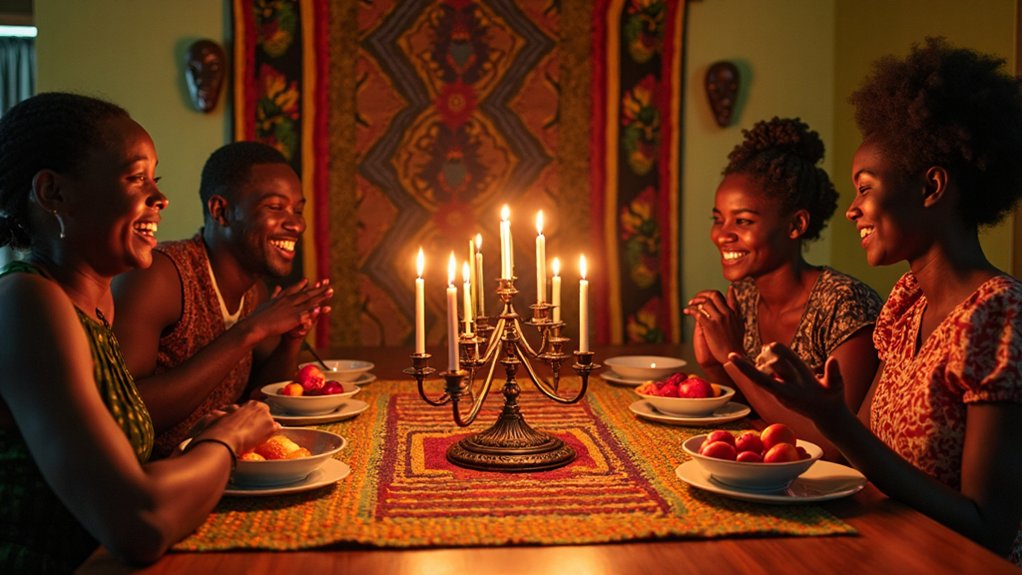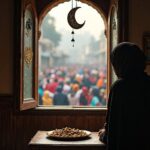Kwanzaa, celebrated from December 26 to January 1, is a special holiday that honors African heritage and culture. Kwanzaa brings families together to reflect on the seven guiding principles, light the kinara, and celebrate unity.
To make your Kwanzaa celebration even more meaningful, incorporate traditional Kwanzaa decorations and ceremonies. Adding colorful Kwanzaa symbols like the kinara, mkeka mat, and unity cup can create a festive atmosphere and deepen everyone’s connection to the holiday.
By understanding and embracing these essential Kwanzaa traditions, you can bring your Kwanzaa celebration to life and create lasting memories with your loved ones.
What Are the Dates of Kwanzaa?
Kwanzaa Dates: When Is Kwanzaa Celebrated?
Kwanzaa is celebrated every year from December 26 to January 1. These Kwanzaa dates offer a special week to honor African heritage and culture.
During the Kwanzaa dates, families and communities come together to light the kinara, share meaningful stories, and enjoy traditional meals.
Each day of the Kwanzaa dates highlights one of the seven guiding principles, promoting unity, community, and self-determination.
Mark your calendar for these important Kwanzaa dates and embrace this vibrant celebration!
The History of Kwanzaa Celebrations
Kwanzaa celebrations have become a meaningful tradition for many people, but the history of Kwanzaa celebrations dates back to 1966. Dr. Maulana Karenga created Kwanzaa as a way to honor African heritage and culture during a time of social change.
The history of Kwanzaa celebrations began as a response to the racial tensions of the era, with the goal of bringing African American communities together.
Today, the history of Kwanzaa celebrations continues to inspire unity, reflection, and connection throughout the winter season.
The Seven Principles of Kwanzaa
Understanding the history of Kwanzaa celebrations is essential for truly appreciating the Seven Principles of Kwanzaa.
The Seven Principles of Kwanzaa—Umoja (Unity), Kujichagulia (Self-Determination), Ujima (Collective Work), Ujamaa (Cooperative Economics), Nia (Purpose), Kuumba (Creativity), and Imani (Faith)—form the foundation of this unique holiday.
By embracing the Seven Principles of Kwanzaa, individuals and families can strengthen their sense of community, encourage personal growth, and honor African heritage.
Celebrating the Seven Principles of Kwanzaa each year is a powerful way to reflect on shared values and build lasting connections.
Traditional Kwanzaa Decorations
Traditional Kwanzaa decorations bring color and meaning to your celebration, helping you honor Kwanzaa’s rich cultural traditions.
When choosing traditional Kwanzaa decorations, consider using vibrant kente cloths, handcrafted items, and important symbols like the kinara with its seven candles.
Add fruits and vegetables as part of your traditional Kwanzaa decorations to symbolize abundance, and showcase African art to connect with your heritage.
Kwanzaa Ceremonies and Rituals
Kwanzaa ceremonies and rituals are at the heart of this meaningful holiday. As you prepare your home with traditional Kwanzaa decorations, remember that Kwanzaa ceremonies and rituals help bring families and communities together.
Each night, begin your Kwanzaa ceremonies and rituals with the lighting of the kinara, which symbolizes the seven principles of Kwanzaa. Gather with loved ones to reflect, share stories, and participate in cultural activities that honor your heritage.
Focusing on a different principle each evening, Kwanzaa ceremonies and rituals encourage unity, understanding, and a deeper connection to the values that make this celebration unique.
Foods Typically Served During Kwanzaa
When celebrating Kwanzaa, Kwanzaa foods play a central role in bringing people together and honoring tradition.
Popular Kwanzaa foods include flavorful dishes like collard greens, cornbread, and sweet potatoes, each representing abundance and unity within the community.
Other classic Kwanzaa foods, such as jollof rice and fried plantains, showcase the holiday’s deep African roots.
Enjoying Kwanzaa foods with family and friends encourages connection and highlights the cultural significance of this special celebration.
Gift Giving in Kwanzaa Celebrations
Gift giving in Kwanzaa celebrations is a meaningful tradition that highlights the importance of community, unity, and responsibility.
When choosing gifts for Kwanzaa celebrations, it’s best to select items that are thoughtful and reflect African heritage, such as handmade crafts or educational materials.
Supporting local artisans with your gift giving in Kwanzaa celebrations not only honors tradition but also helps foster stronger community bonds.
Community Events and Activities
Kwanzaa community events and activities are an essential part of celebrating this meaningful holiday. By joining Kwanzaa community events and activities, you can connect with others, honor African heritage, and embrace the seven principles of Kwanzaa.
Participate in local Kwanzaa community events and activities such as cultural performances, storytelling, music, dance, and sharing traditional foods. These experiences not only deepen your understanding of Kwanzaa but also help strengthen the bonds within your community, making the holiday even more special for everyone involved.
How Kwanzaa Is Celebrated Around the World
Kwanzaa is celebrated around the world in many unique and meaningful ways, highlighting the beauty of African heritage and community.
During Kwanzaa, families and friends come together to light the kinara, enjoy festive meals, and share stories that honor their roots.
In various countries, Kwanzaa celebrations may include vibrant parades, music, and dance performances that bring people together.
Educational workshops also play a big role during Kwanzaa, teaching participants about African traditions and the importance of unity and collective responsibility.
No matter where you are, Kwanzaa is a special time to celebrate togetherness and embrace the core values of this holiday.
Conclusion
Kwanzaa is a vibrant celebration that connects you to your heritage and community. Celebrating Kwanzaa means honoring the seven principles and incorporating traditional Kwanzaa decorations, rituals, and foods into your festivities.
Whether you’re lighting the kinara or sharing stories with loved ones, celebrating Kwanzaa helps strengthen cultural pride and unity. Embrace the spirit of Kwanzaa and carry its meaningful lessons into the new year, fostering unity, joy, and a deeper connection to your cultural roots every day.
José Lucas is a researcher of history and spirituality, driven by a lifelong fascination with how faith shapes the human experience. He specializes in exploring the historical contexts of diverse traditions, translating ancient wisdom into practical insights for the modern seeker. At ABPray, José’s mission is to guide readers through the world’s vast spiritual heritage with curiosity and reverence, fostering a deeper understanding of the universal values that unite us all.
Faith & Celebration
Yom Kippur: when tradition claims continuity while meaning completely transforms
When a modern Jewish family sits in synagogue on Yom Kippur, fasting, praying, confessing sins in communal voice, they believe they are practicing an unbroken tradition stretching back 3,400 years to Leviticus. But this belief contains a profound falsehood. Modern Yom Kippur is not the same as biblical Yom Kippur. Structurally, theologically, and practically, they […]
Holidays
When you’re Muslim and your coworkers want you at the Thanksgiving table: the hidden textual war over gratitude in Islam
Just what influences some Muslims to forgo festive celebrations, and how do these choices reflect their deeper values and beliefs? Discover the compelling reasons behind their decisions.
Holidays
The architecture of sacred time: how different countries calculate easter and why it reveals the machinery of religious authority
Uncover the reasons behind the varying dates of Easter celebrations worldwide and discover how calendars influence this cherished holiday. What secrets lie in these differences?
Holidays
Saint Patrick’s Day beyond the green: how religion, nationalism, and diaspora turned a christian feast into a global political symbol
Saint Patrick’s Day is often perceived as one of the most accessible cultural celebrations in the world. It appears lighthearted, colorful, and deliberately uncomplicated. Green clothing, parades, shamrocks, music, and alcohol dominate the imagery. Participation requires no explanation, no commitment, and no prior knowledge. For many, it is simply a festive day loosely associated with […]
Holidays
Why Abraham Lincoln made Thanksgiving a national holiday?
To understand why Abraham Lincoln declared Thanksgiving a national holiday, one must delve into the turbulent era of the Civil War and its deeper meanings.
Holidays
Historical origins of Halloween celebration
Curious about Halloween’s ancient origins? Discover the Celtic, Roman, and Christian influences that shaped this spooky celebration and what they reveal today.






